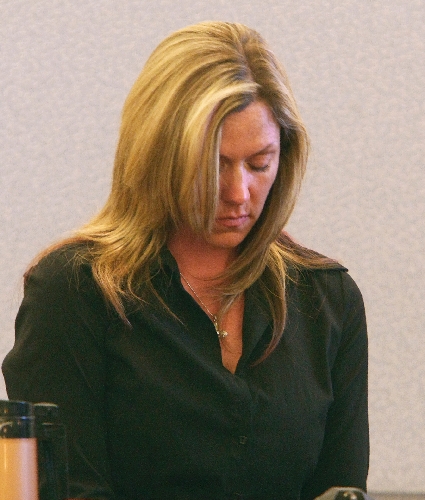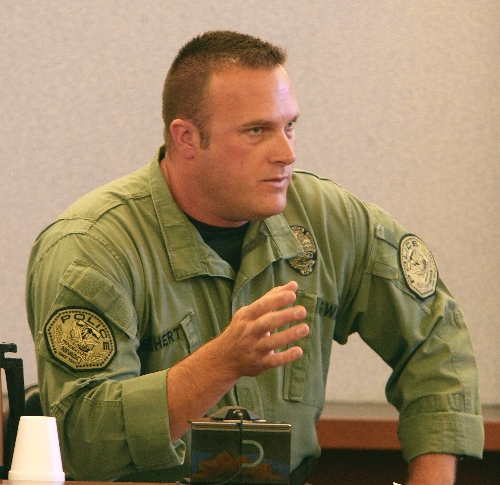Coroner’s inquest jury rules man who died in police standoff committed suicide
The 911 call came from a mental health clinic where a distraught Malissa Thatcher had hoped to meet her suicidal husband, where she hoped he could get some help.
Instead, Thatcher told a dispatcher the morning of April 22 that her estranged husband, a state fire marshal's investigator and former Nevada Highway Patrol trooper, had holed up in his Henderson home with several weapons and was in a "weird, delusional state."
"He's not like this," she told the dispatcher tearfully. "I don't know what's wrong with him. I don't know what's happening."
Just hours later, Eric Jason Thatcher, 38, was dead. The father of two shot himself in the head with a handgun after a lengthy standoff during which he fired 39 shotgun and rifle shots out of windows at police officers, striking a police car and several adjacent residences, police said.
A coroner's inquest jury unanimously ruled Friday that Thatcher committed suicide. The jury deliberated about 15 minutes.
Ritch Melchert, a Henderson SWAT officer who was stationed 140 yards away in the backyard of another home, shot and struck Thatcher in the upper right arm through a second story window shortly before Thatcher turned the gun on himself, officials said during Friday's inquest.
It was the second and last shot fired by law enforcement during the incident that unfolded in the 2700 block of Auchmull Street, south of Sun City Anthem Drive. The first shot, also fired by Melchert, missed.
Melchert and a Henderson police officer also at the scene testified they worried Thatcher would continue shooting and eventually hit one of the officers or neighbors.
"Several people were in harm's way," said Melchert, a 10-year Police Department veteran.
Police later discovered a rifle, a shotgun and three handguns in the house, Henderson police Detective Chad Mitchell said.
Police also found "buckets" of ammo, he said.
Thatcher's brother, who left the home shortly before the standoff began, told the Review-Journal in April that Thatcher was convinced helicopters were watching the house and that there was some sort of "conspiracy" against him.
Ron Thatcher, who had flown in from San Jose, Calif., the day before to try to save his depressed sibling, said he left the house because he didn't want to be there when Eric Thatcher killed himself.
Ron Thatcher then spoke by phone to his brother's wife at the mental health clinic.
"I felt like I had no other option," Malissa Thatcher testified on Friday. "I did call the police."
Eric Thatcher had been depressed both over separating from his wife about a month before the standoff and over the details of his departure from the Nevada Highway Patrol, his brother said.
Eric Thatcher was fired in May 2005 after an internal investigation into his arrest of a hit-and-run suspect who accused him of using excessive force.
After he challenged his firing, a hearing master determined the investigation was "seriously flawed" and reinstated the trooper with full back pay. But Thatcher never again felt accepted by his fellow troopers, his brother said. Thatcher later resigned and joined the state fire marshal's office.
The Clark County coroner's office also ruled in April that Thatcher took his own life, dying from a self-inflicted "intra-oral" gunshot wound to the head.
Inquests typically are held to determine whether an officer's actions that resulted in the death of a suspect are justifiable, excusable or criminal.
An inquest is not uncommon in suicides when officers shoot at someone, the coroner's office said.
Contact reporter Lynnette Curtis at lcurtis@reviewjournal.com or 702-383-0285.


















